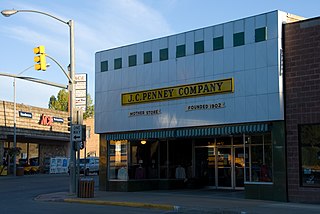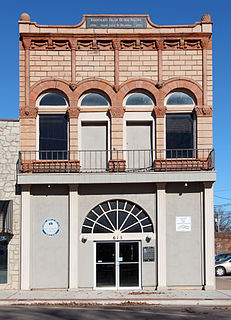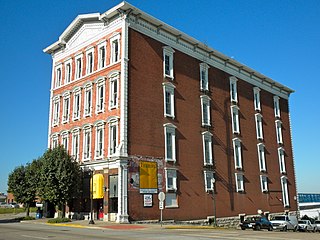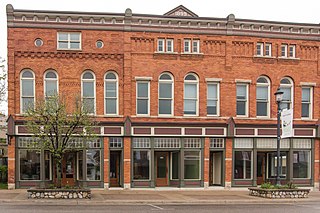
The Sullivan Center, formerly known as the Carson, Pirie, Scott and Company Building or Carson, Pirie, Scott and Company Store, is a commercial building at 1 South State Street at the corner of East Madison Street in Chicago, Illinois. Louis Sullivan designed it for the retail firm Schlesinger & Mayer in 1899 and later expanded it before H.G. Selfridge & Co. purchased the structure in 1904. That firm occupied the structure for only a matter of weeks before it sold the building to Otto Young, who then leased it to Carson Pirie Scott for $7,000 per month, which occupied the building for more than a century until 2006. Subsequent additions were completed by Daniel Burnham in 1906 and Holabird & Root in 1961.

The J. C. Penney Historic District is a historic district in Kemmerer, Wyoming encompassing several properties associated with James Cash Penney (1875-1971). The district includes the Golden Rule Store, the first in what became the J. C. Penney department store chain, and Penney's home during the store's early years. The district was declared a National Historic Landmark District in 1978, for Penney's role in creating one of the first national department store chains.

The Lower Woodward Avenue Historic District, also known as Merchant's Row, is a mixed-use retail, commercial, and residential district in downtown Detroit, Michigan, located between Campus Martius Park and Grand Circus Park Historic District at 1201 through 1449 Woodward Avenue and 1400 through 1456 Woodward Avenue. The district was listed on the National Register of Historic Places in 1999.

Building at 409 West Baltimore Street, also known as the N. Hess & Bro. Building, is a historic retail and wholesale building located at Baltimore, Maryland, United States. It is a four-story brick commercial building with a cast-iron façade above an altered storefront, erected about 1875. Built originally for a wholesale grocery company, it was subsequently occupied by a boot and shoe factory, and a series of wholesale and retail dry goods or clothing stores.

The U.S. Custom House, also known as the Old Post Office and Custom House, is a historic government building at 423 Canal Street in New Orleans, Louisiana. It was designated a National Historic Landmark, receiving this designation in 1974 and noted for its Egyptian Revival columns. Construction on the building, designed to house multiple federal offices and store goods, began in 1848 and didn't finish until 1881 due to redesigns and the American Civil War. The U.S. Customs offices have been located there since the late 19th century.

The United States Customs House and Court House, also known as Old Galveston Customhouse, in Galveston, Texas, is a former home of custom house, post office, and court facilities for the United States District Court for the Eastern District of Texas, and later for the United States District Court for the Southern District of Texas. Completed in 1861, the structure is now leased by the General Services Administration to the Galveston Historical Foundation. The courthouse function was replaced in 1937 by the Galveston United States Post Office and Courthouse.

The Clark Memorial Hall, also known as the Adrian I.O.O.F. Hall, is a commercial building located at 120–124 South Winter Street (M-52) in the Downtown Adrian Commercial Historic District in Adrian, Michigan. It was designated as a Michigan Historic Site and individually listed on the National Register of Historic Places on January 14, 1985.

W. J. Hughes Business House, also known as C.J. Wilson Store, is located at 70 Ocoee Street in Cleveland, Tennessee, United States. It was listed on the National Register of Historic Places in 1975.

The Sundberg Block was a commercial building located at 517–523 Iron Street in Negaunee, Michigan, United States. It was listed on the National Register of Historic Places in 2011. It was later demolished in November 2016 and removed from the NRHP in 2020.

The Hohberger Building is an historic building located in the East Village of Des Moines, Iowa, United States. The building was built in 1895 and is one of the few remaining examples of a cast-iron column structure in the city. A dry goods store named Dockstader & Co. was the first retail establishment to occupy the building (1899–1915). The building stood empty for several years until it was renovated in 1999. The ground level of the building remains retail space and the upper floors are occupied by offices. It was individually listed on the National Register of Historic Places in 1978.In 2019 it was included as a contributing property in the East Des Moines Commercial Historic District.

Butlers' Store is a group of three historic commercial buildings in New Hope, Alabama. The Butler family began their dry goods and hardware business in the 1850s, and in 1909 built 2 two-story buildings on New Hope's main street. The central building was used for a general merchandise, dry goods, and hardware store and office space. It features a five-bay façade with cast iron columns separating large glass panes atop wood panel bulkheads on the storefront level. Large transom windows over the main windows cast light into the room with 18-foot (5.5-meter) ceilings and a mezzanine in the rear. The northern building was used for a bank until the Great Depression, after which it was connected to the central building and used as a grocery store. It is shorter than the central building, due to a lower ceiling on the ground floor. Both of the older buildings have brick corbelling and slightly arched second-floor windows. The one-story southern building was constructed in 1939 and housed a furniture store. Three bays in width, its ground floor appearance is similar to the northern building, but its roofline is more plain.

The Elbert H. Parsons Law Library is a historic commercial building in Huntsville, Alabama. It was built in 1913 by the May and Cooney Dry Goods company to replace their building which was destroyed by a fire in 1911. The store occupied the building until 1931, when they went bankrupt due to the Great Depression. J. C. Penney moved into the building in 1934 and remained until 1966, when it moved to "The Mall" on University Drive. In 1973, it was purchased by the county and renovated to house a public law library.

The Wolleson–Nicewander Building, also known as the Triton Insurance Company Building, was built in 1900, and is within the Perry Courthouse Square Historic District in Perry, Oklahoma. Its builder, T. E. Wollenson, was a sailor and merchant who had immigrated from Denmark, and settled in Perry. Wollenson bought a lot on the north side of what is now called Courthouse Square. He then built a two-story building, that soon housed the Nicewander Clothing store. Later occupants included a dry goods store, a tire and auto supply store, and an insurance company headquarters.

The S.J. Lesem Building is a historic commercial building located at 135-37 North 3rd Street in Quincy, Illinois. The building was constructed in 1871 for S.J. Lesem Brothers and Company, a dry goods firm founded in 1859; it is the only survivor of the four commercial buildings which once occupied the block, which was known as Wholesale Row. After the dry goods company changed ownership and moved elsewhere, the Quincy Casket Company occupied the building from 1912 to 1977. The four-story building has a commercial Italianate design. The building's windows are tall and narrow with arched or pedimented hoods, and its storefront features brick pilasters and cast iron columns. Cast iron quoins adorn the corners of the building. The top of the building features a bracketed cornice and a pediment on the front facade.

Schramm Building, also known as Jochims Building, is a historic building located in the central business district of Burlington, Iowa, United States. It was individually listed on the National Register of Historic Places in 1999, and it was included as a contributing property in the Downtown Commercial Historic District in 2015.

T.S. Martin and Company, also known as Karlton's, Fishgalls & Cameo, is a historic building located in Sioux City, Iowa, United States. It is an L-shaped structure that fronts both Fourth Street and Nebraska Street. It was occupied by one of three locally owned department stores from 1894 to 1919. The buildings on Fourth Street were originally built in 1885. T.S. Martin and Company itself dates from 1880 when Thomas Sanford Martin opened a dry goods store in rented commercial space. He first acquired 515-517 Fourth Street in 1885, which he leased to a clothing store, and his brother Louis opened T.S. Martin and Company Shoes by leasing 519 Fourth Street the same year.

The East Jordan Lumber Company Store Building is a commercial building located at 104 Main Street in East Jordan, Michigan. It was listed in the National Register of Historic Places in 2008. It is next to, and shares a wall with, the Votruba Block; both buildings have been rehabilitated to form the Main Street Center office complex.

The Votruba Block is a commercial building located at 112 Main Street in East Jordan, Michigan. It was listed in the National Register of Historic Places in 2008. It is next to, and shares a wall with, the East Jordan Lumber Company Store Building; both buildings have been rehabilitated to form the Main Street Center office complex.

The Warren Featherbone Company Office Building is an office building located at 3 North Elm Street in Three Oaks, Michigan. It was listed on the National Register of Historic Places in 1986. It now houses the Three Oaks Public Library.

The Mottman Building is an historic commercial building located at the Northwest corner of Capitol Way N & 4th Ave W in downtown Olympia, Washington. Originally constructed in 1888 as the Olympic Block by Samuel Williams for Toklas & Kaufman to house their department store, the building was remodeled and expanded to its current state in 1911 by prominent Olympia realtor and eventual mayor George Mottman, whose own department store, the Mottman Mercantile, occupied the building until 1967. It was listed on the National Register of Historic Places in 1983.























